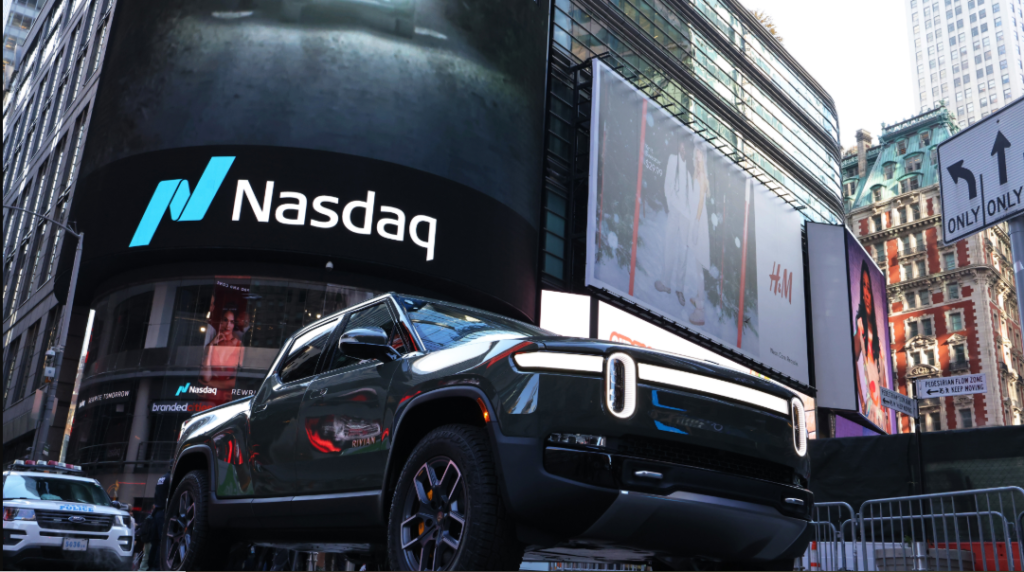Rivian Automotive, an electric vehicle (EV) manufacturer, has captured significant attention in the financial markets since its initial public offering (IPO) in November 2021. The focus keyword, Rivian stock, reflects the growing interest in this company’s market performance and future potential. Rivian aims to redefine sustainable transportation with its electric trucks, SUVs, and delivery vans, positioning itself as a competitor to Tesla and traditional automakers. However, rivian stock has experienced volatility, with an 89% decline over five years and an 85% drop since its IPO price of $78 per share, now trading around $11.80. Despite these challenges, strategic partnerships with Volkswagen and Amazon have fueled optimism about its long-term growth. This article provides an in-depth analysis of Rivian stock, exploring its market performance, company leadership, and investment potential, while incorporating supported keywords like Rivian stock price, Rivian IPO, and Rivian market trends to enhance SEO readability.
Rivian’s Business Model and Market Position
Rivian’s business model centers on producing premium electric vehicles, including the R1T pickup truck, R1S SUV, and commercial delivery vans for partners like Amazon. The company differentiates itself with rugged, adventure-focused designs and advanced technology, appealing to eco-conscious consumers. However, Rivian faces challenges, including production bottlenecks and significant financial losses, with a reported $38,000 loss per vehicle in Q1 2024. Rivian stock reflects these struggles, with a market cap of approximately $16 billion despite low delivery numbers (14,200 units in Q3 2024). Supported keywords like Rivian EV production and Rivian financial performance highlight the company’s operational hurdles. Rivian’s partnership with Volkswagen, involving a $5 billion investment, aims to bolster its software and production capabilities, potentially stabilizing Rivian stock price. While Rivian holds a niche in the EV market, scaling production remains critical to improving its market position and investor confidence.
Historical Performance of Rivian Stock
Since its IPO, Rivian stock has been a rollercoaster for investors. Priced at $78 per share, it initially soared due to hype around the EV sector but later plummeted, dropping 44% in 2024 alone after Rivian cut its production guidance to 47,000–49,000 vehicles. The Rivian stock price decline reflects broader market concerns about EV demand and Rivian’s cash burn rate, with $9.4 billion in cash reserves as of Q4 2023 and $1.4 billion burned quarterly. Supported keywords like Rivian stock performance and Rivian market trends underscore these challenges. However, positive developments, such as a Q3 2023 earnings beat (revenue of $1.34 billion versus $1.31 billion estimated), have occasionally boosted Rivian stock. Investors must weigh these fluctuations against Rivian’s long-term potential, as partnerships and new vehicle platforms could drive future growth.

Strategic Partnerships Boosting Rivian Stock
Rivian’s partnerships with Amazon and Volkswagen are pivotal for its growth and Rivian stock outlook. Amazon, an early investor, uses Rivian’s electric delivery vans, though some posts on X suggest Amazon has scaled back its commitment. Volkswagen’s $5 billion investment, announced in June 2024, includes a joint venture to develop EV software, with Rivian’s technology integrated into Volkswagen vehicles by 2026. These partnerships enhance Rivian’s credibility and financial stability, positively impacting Rivian stock price. Supported keywords like Rivian partnerships and Rivian Volkswagen deal emphasize their significance. Despite these alliances, Rivian must address production inefficiencies to fully capitalize on these opportunities. For investors, these partnerships signal long-term potential, but short-term volatility in Rivian stock remains a concern due to ongoing operational challenges.
Challenges Facing Rivian Stock
Rivian faces significant hurdles that pressure Rivian stock. High production costs and negative gross margins—reportedly persisting for eight consecutive quarters—limit profitability. In Q1 2024, Rivian lost $38,000 per vehicle, highlighting inefficiencies. Additionally, supply chain constraints and reduced production forecasts (47,000–49,000 vehicles in 2024) have dampened investor confidence. Supported keywords like Rivian production challenges and Rivian financial losses capture these issues. Competition from Tesla and legacy automakers, coupled with softening EV demand, further complicates Rivian’s path. Rivian stock performance is also affected by macroeconomic factors like interest rates, which impact consumer spending on high-priced EVs (Rivian’s vehicles average $78,000). While Rivian’s innovation and partnerships provide hope, overcoming these challenges is essential for Rivian stock to regain investor trust and achieve sustainable growth.
Biography of RJ Scaringe, Rivian’s CEO
| Attribute | Details |
|---|---|
| Full Name | Robert Joseph Scaringe |
| Born | January 19, 1983, Melbourne, Florida, USA |
| Education | B.S. in Mechanical Engineering, MIT; M.S. and Ph.D. in Mechanical Engineering, MIT |
| Occupation | Founder and CEO, Rivian Automotive |
| Founded Rivian | 2009 |
| Net Worth | Estimated $1 billion (2023, Forbes) |
| Awards | Automotive News All-Star (2021), MotorTrend Person of the Year (2022) |
| Marital Status | Married to Meaghan Scaringe; three children |
RJ Scaringe, the visionary behind Rivian, has shaped the company’s mission to accelerate the transition to sustainable mobility. His leadership has driven Rivian stock through its highs and lows, leveraging his engineering expertise to innovate in the EV space.
RJ Scaringe’s Early Life and Education
Born in Melbourne, Florida, RJ Scaringe grew up with a passion for automobiles, often tinkering with cars in his family’s garage. His curiosity for engineering led him to the Massachusetts Institute of Technology (MIT), where he earned a bachelor’s, master’s, and Ph.D. in mechanical engineering. At MIT, Scaringe focused on automotive design and sustainability, laying the groundwork for Rivian. His academic rigor and hands-on approach to problem-solving shaped his vision for an EV company that could challenge industry giants. Supported keywords like Rivian CEO and RJ Scaringe biography highlight his pivotal role. Scaringe’s early experiences instilled a commitment to environmental responsibility, influencing Rivian’s mission and impacting Rivian stock as investors bet on his leadership to navigate the competitive EV market.

RJ Scaringe’s Parents: Gail Scaringe
Gail Scaringe, RJ’s mother, played a significant role in his upbringing, fostering a supportive environment that nurtured his ambitions. A registered nurse, Gail emphasized the importance of education and perseverance, values that RJ credits for his success. Her career in healthcare exposed RJ to the human impact of environmental issues, indirectly shaping his focus on sustainable transportation. Gail’s influence is evident in RJ’s holistic approach to leadership, balancing innovation with social responsibility. While less is known about her personal life, her dedication to family and community left a lasting impression on RJ, contributing to his drive to create Rivian and influence Rivian stock through a mission-driven company. Supported keywords like RJ Scaringe family underscore her role in his journey.
RJ Scaringe’s Parents: Robert Scaringe Sr.
Robert Scaringe Sr., RJ’s father, was an engineer and entrepreneur who ran a construction business in Florida. His technical background and problem-solving mindset deeply influenced RJ’s interest in engineering and innovation. Robert Sr. encouraged RJ to pursue hands-on projects, from rebuilding car engines to designing mechanical systems, fostering a practical approach to learning. His entrepreneurial spirit inspired RJ to found Rivian in 2009, a venture that has directly impacted Rivian stock. Robert Sr.’s guidance helped RJ develop resilience, crucial for navigating Rivian’s financial and operational challenges. Supported keywords like RJ Scaringe parents highlight the foundational role his father played in shaping his career and Rivian’s trajectory in the EV industry.
RJ Scaringe’s Personal Life and Spouse
RJ Scaringe is married to Meaghan Scaringe, a private individual who prefers to stay out of the public eye. The couple has three children and resides in California, close to Rivian’s headquarters. Meaghan, reportedly a professional in the nonprofit sector, shares RJ’s commitment to sustainability, supporting his vision for Rivian. Their partnership provides RJ with personal stability, allowing him to focus on steering Rivian through turbulent times, which indirectly influences Rivian stock. Supported keywords like RJ Scaringe wife and Rivian CEO personal life reflect interest in his personal dynamics. While details about Meaghan are limited, her role as a supportive partner underscores RJ’s ability to balance family and leadership, contributing to his effectiveness as CEO and Rivian’s market narrative.
Rivian’s Technological Innovations
Rivian’s technological advancements, such as its skateboard platform and proprietary software, set it apart in the EV industry. The skateboard chassis integrates batteries and motors, enabling flexible vehicle designs like the R1T and R1S. Rivian’s software, which Volkswagen will leverage, enhances vehicle performance and user experience through over-the-air updates. These innovations bolster Rivian stock by positioning the company as a technology leader. Supported keywords like Rivian technology and Rivian EV innovations highlight these strengths. However, scaling these technologies to meet production demands remains a challenge, as seen in Rivian’s reduced 2024 forecasts. Investors view Rivian’s tech as a long-term asset, but short-term execution risks continue to weigh on Rivian stock price.
Market Sentiment and Analyst Outlook
Market sentiment around Rivian stock is mixed, reflecting both optimism and caution. Analyst upgrades, such as Piper Sandler’s Buy rating in March 2024, cite Rivian’s new vehicle platform and cash reserves as positives. However, posts on X highlight skepticism, with some calling Rivian’s $16 billion valuation inflated given its losses. Supported keywords like Rivian stock analysis and Rivian market sentiment capture these dynamics. Analysts project Rivian stock could recover if production ramps up and partnerships deliver, but high cash burn and competition pose risks. SEO-optimized content around Rivian stock performance must address these sentiments to engage readers, balancing Rivian’s potential with its challenges to maintain readability and relevance.
Future Prospects for Rivian Stock
The future of Rivian stock hinges on execution. Rivian’s R2 and R3 models, set for release in 2026, target a broader market with lower price points, potentially boosting sales. The Volkswagen partnership could streamline production and software development, enhancing Rivian stock price. Supported keywords like Rivian future growth and Rivian stock forecast emphasize these opportunities. However, Rivian must overcome supply chain issues and achieve profitability to sustain investor confidence. Macroeconomic factors, such as EV subsidies and interest rates, will also influence Rivian stock. For investors, Rivian offers high-risk, high-reward potential, with its stock likely to remain volatile until it proves operational efficiency and market traction.

Investment Considerations for Rivian Stock
Investing in Rivian stock requires weighing its growth potential against significant risks. Rivian’s innovative vehicles and partnerships make it a compelling long-term bet, but its $1 billion quarterly losses and negative margins raise red flags. Supported keywords like Rivian investment risks and Rivian stock outlook guide this analysis. Diversifying portfolios and setting realistic expectations are crucial, given Rivian stock’s volatility. Investors should monitor Rivian’s production milestones and partnership outcomes, as these will drive Rivian stock performance. SEO optimization ensures this content reaches risk-tolerant investors searching for Rivian stock analysis, providing clear, readable insights into whether Rivian aligns with their financial goals.
About Rivian Stock
What is the current price of Rivian stock
As of October 2024, Rivian stock price is approximately $11.80, down significantly from its IPO price of $78.
Why has Rivian stock declined
Rivian stock has dropped due to production challenges, high losses ($38,000 per vehicle in Q1 2024), and reduced 2024 guidance (47,000–49,000 vehicles).
How does the Volkswagen partnership affect Rivian stock
Volkswagen’s $5 billion investment and joint venture for EV software bolster Rivian stock by enhancing financial stability and technological reach.
Is Rivian stock a good investment
Rivian stock offers high-risk, high-reward potential. Its partnerships and new models are promising, but losses and competition pose challenges.
Who is the CEO of Rivian
RJ Scaringe, founder and CEO, leads Rivian, driving its mission and influencing Rivian stock through his vision and leadership.

